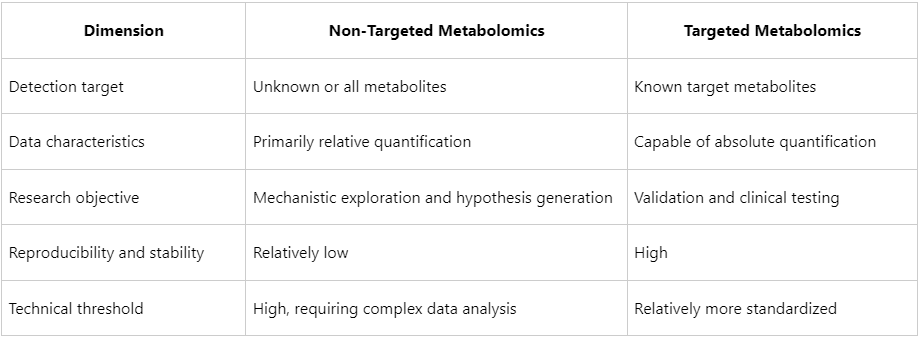What Is Untargeted Metabolomics?
Untargeted metabolomics is an analytical approach designed to comprehensively profile as many metabolites as possible within a given sample, characterized by broad coverage, a non-biased approach, and an exploratory nature. This methodology is primarily employed for the discovery of unknown metabolites, metabolic pathway screening, and elucidation of disease mechanisms, with extensive applications in life sciences, medicine, nutrition, and drug development. Technically, untargeted metabolomics typically relies on high-resolution mass spectrometry (HRMS) platforms, such as Orbitrap or Q-TOF, coupled with gas chromatography (GC) or liquid chromatography (LC) to achieve comprehensive detection of small-molecule metabolites.
Core Features of Untargeted Metabolomics

Technical Workflow of Untargeted Metabolomics
Untargeted metabolomics generally involves the following key stages:
1. Sample Preparation
Different types of samples (e.g., plasma, urine, tissues, cells) require specific preparatory procedures, including protein precipitation, liquid–liquid extraction, and derivatization, to remove interfering substances while preserving metabolites.
2. Chromatographic Separation
The choice of separation technique depends on metabolite properties:
(1) Liquid Chromatography (LC): suitable for polar metabolites such as amino acids, organic acids, and nucleotides.
(2) Gas Chromatography (GC): suitable for volatile metabolites or those amenable to derivatization, such as fatty acids and organic acids.
3. Mass Spectrometry Detection
High-resolution mass spectrometry (e.g., Orbitrap, Q-TOF) is employed in full-scan mode combined with either data-dependent acquisition (DDA) or data-independent acquisition (DIA) to obtain primary mass spectra (MS1) and tandem mass spectrometry (MS/MS) fragmentation data.
4. Data Preprocessing
This stage typically includes:
(1) Peak extraction and alignment
(2) Removal of noise and background signals
(3) Correction for batch effects and normalization
(4) Metabolite annotation based on m/z values, retention time, and MS/MS spectral matching
5. Statistical and Bioinformatics Analysis
Common analytical methods include:
(1) PCA/PLS-DA for exploring inter-sample differences
(2) Differential metabolite screening based on VIP values, p-values, and fold change (FC)
(3) Metabolic pathway enrichment analysis using resources such as KEGG and MetaboAnalyst
Application Scenarios of Untargeted Metabolomics
1. Disease Mechanism Research
Comparative analysis of metabolic profiles between healthy and diseased cohorts facilitates the identification of key metabolic pathways and pathological associations, aiding in the elucidation of molecular mechanisms underlying disease onset and progression.
2. Biomarker Discovery
In large-scale cohorts, metabolites significantly associated with disease states, drug responses, or nutritional conditions are identified, providing leads for subsequent targeted validation and clinical diagnostics.
3. Drug Mechanism of Action and Safety Evaluation
Used to assess the global regulatory effects of drugs on metabolic networks, enabling the identification of potential targets, toxicity pathways, and off-target effects.
4. Nutrition and Food Science Research
Uncovers the metabolic effects of specific nutritional interventions, such as changes induced by high-fat diets, functional foods, or probiotic intake.
5. Plant and Microbial Metabolism Research
Valuable for studying plant metabolic regulation, discovering microbial secondary metabolites, and evaluating the metabolic functions of microbial communities.
Advantages and Challenges of Untargeted Metabolomics
1. Advantages
(1) Unbiased coverage: no requirement for prior knowledge, suitable for exploring unknown mechanisms.
(2) Rich information content: encompasses diverse metabolite classes, including amino acids, sugars, lipids, and organic acids.
(3) High discovery potential: facilitates identification of novel metabolites and potential biomarkers.
2. Limitations
(1) Limited quantitative accuracy: predominantly relative quantification, susceptible to batch effects and instrument drift.
(2) High data complexity: extended processing workflows necessitate specialized analytical expertise.
(3) Challenges in metabolite identification: m/z and retention time alone are insufficient for structure confirmation, requiring MS/MS spectra or authentic standards for verification.
(4) Limited reproducibility: low methodological standardization hinders large-scale validation.
Untargeted Metabolomics vs. Targeted Metabolomics

MtoZ Biolabs, leveraging internationally advanced high-resolution mass spectrometry platforms (Thermo Orbitrap/Q-TOF) and automated bioinformatics pipelines, offers scientific research clients high-coverage, high-confidence, and translatable untargeted metabolomics services:
(1) Comprehensive metabolite annotation system integrating MS-DIAL, GNPS, HMDB, LipidBlast, and other databases
(2) Expert analytical support spanning differential analysis, pathway enrichment, and multi-omics integration
(3) Compatibility with diverse sample types, including serum, urine, cerebrospinal fluid, tissue, and feces
(4) Standardized quality control system encompassing QC samples, blanks, internal standards, and batch correction procedures
Untargeted metabolomics not only provides researchers with a metabolic window into biological systems but also lays a robust foundation for subsequent targeted studies and clinical translation. MtoZ Biolabs is dedicated to serving as a long-term partner in metabolomics research, delivering high-quality data to advance every scientific endeavor.
MtoZ Biolabs, an integrated chromatography and mass spectrometry (MS) services provider.
Related Services
How to order?







